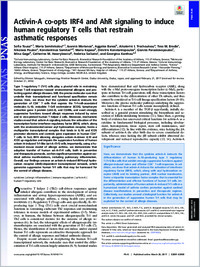Activin-A co-opts IRF4 and AhR signaling to induce human regulatory T cells that restrain asthmatic responses
- Tousa, Sofia Cellular Immunology Laboratory, Center for Basic Research, Biomedical Research Foundation of the Academy of Athens, 115 27 Athens, Greece
- Semitekolou, Maria Cellular Immunology Laboratory, Center for Basic Research, Biomedical Research Foundation of the Academy of Athens, 115 27 Athens, Greece
- Morianos, Ioannis Cellular Immunology Laboratory, Center for Basic Research, Biomedical Research Foundation of the Academy of Athens, 115 27 Athens, Greece
- Banos, Aggelos Molecular Biology Laboratory, Center for Basic Research, Biomedical Research Foundation of the Academy of Athens, 115 27 Athens, Greece
- Trochoutsou, Aikaterini I. Cellular Immunology Laboratory, Center for Basic Research, Biomedical Research Foundation of the Academy of Athens, 115 27 Athens, Greece
- Brodie, Tess M. Institute of Computational Science (ICS), Faculty of Biomedical Sciences, Università della Svizzera italiana, Switzerland
- Poulos, Nikolaos Cellular Immunology Laboratory, Center for Basic Research, Biomedical Research Foundation of the Academy of Athens, 115 27 Athens, Greece
- Samitas, Konstantinos Cellular Immunology Laboratory, Center for Basic Research, Biomedical Research Foundation of the Academy of Athens, 115 27 Athens, Greece - 7th Respiratory Medicine Department and Asthma Center, “Sotiria” Athens Chest Hospital, 115 27 Athens, Greece
- Kapasa, Maria Molecular Biology Laboratory, Center for Basic Research, Biomedical Research Foundation of the Academy of Athens, 115 27 Athens, Greece
- Konstantopoulos, Dimitris Department of Molecular Biology and Genetics, Biomedical Sciences Research Center “Alexander Fleming,” 16602 Athens, Greece
- Paraskevopoulos, Giannis Department of Allergology, “401 General Military Hospital of Athens,” 115 27 Athens, Greece
- Gaga, Mina 7th Respiratory Medicine Department and Asthma Center, “Sotiria” Athens Chest Hospital, 115 27 Athens, Greece
- Hawrylowicz, Catherine M. Department of Asthma, Allergy, and Respiratory Science, Kings College, London WC2R 2LS, United Kingdom
- Sallusto, Federica Institute of Computational Science (ICS), Faculty of Biomedical Sciences, Università della Svizzera italiana, Switzerland
- Xanthou, Georgina Cellular Immunology Laboratory, Center for Basic Research, Biomedical Research Foundation of the Academy of Athens, 115 27 Athens, Greece
-
20.03.2017
Published in:
- Proceedings of the national academy of sciences of the United States of America. - 2017, vol. 114, no. 14, p. E2891-E2900
English
Type 1 regulatory T (Tr1) cells play a pivotal role in restraining human T-cell responses toward environmental allergens and protecting against allergic diseases. Still, the precise molecular cues that underlie their transcriptional and functional specification remain elusive. Here, we show that the cytokine activin-A instructs the generation of CD4+ T cells that express the Tr1-cell–associated molecules IL-10, inducible T-Cell costimulator (ICOS), lymphocyte activation gene 3 protein (LAG-3), and CD49b, and exert strongly suppressive functions toward allergic responses induced by naive and in vivo-primed human T helper 2 cells. Moreover, mechanistic studies reveal that activin-A signaling induces the activation of the transcription factor interferon regulatory factor (IRF4), which, along with the environmental sensor aryl hydrocarbon receptor, forms a multipartite transcriptional complex that binds in IL-10 and ICOS promoter elements and controls gene expression in human CD4+ T cells. In fact, IRF4 silencing abrogates activin-A– driven IL10 and ICOS up-regulation and impairs the suppressive functions of human activin-A–induced Tr1-like (act-A–iTr1) cells. Importantly, using a humanized mouse model of allergic asthma, we demonstrate that adoptive transfer of human act-A–iTr1 cells, both in preventive and therapeutic protocols, confers significant protection against cardinal asthma manifestations, including pulmonary inflammation. Overall, our findings uncover an activin-A–induced IRF4-aryl hydrocarbon receptor (AhR)–dependent transcriptional network, which generates suppressive human Tr1 cells that may be harnessed for the control of allergic diseases.
- Language
-
- English
- Classification
- Medicine
- License
-
License undefined
- Open access status
- green
- Identifiers
-
- RERO DOC 324257
- DOI 10.1073/pnas.1616942114
- ARK ark:/12658/srd1318940
- Persistent URL
- https://n2t.net/ark:/12658/srd1318940
Statistics
Document views: 202
File downloads:
- Texte intégral: 201
